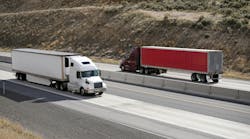Although the IRS finalized guidlines a decade ago for auto and meal allowances paid to drivers who use their own vehicles, some companies are still being "tripped" up. In June the U.S. Court of Appeals for the Ninth Circuit ruled that Trans-Box Systems should have treated all payments to its "owner-operators" as being subject to employment tax.
Although operators supplied their own delivery vehicles, Trans-Box paid them by the hour and issued W-2s, indicating they were employees, not independent contractors. The company tried to treat part of its hourly payments as auto lease payments, but the court sided with a U.S. District Court that had ruled the payments were part of wages.
Trucks purchased and put in service after July 3, 2000, must have an identification number from FMCSA displayed on both sides, along with the legal name of the company that owns or controls the operation of the vehicle. Fleets using the old ICC numbers have two years to change to the new system.
One exception: Companies that don't have their legal or trade name on the truck have five years to add it. Information can be painted on or displayed on a removable sign, as long as it can be read from 50 ft. away.
NTSB has recommended that DOT establish new safety requirements for loading and unloading hazardous materials, mainly to prevent accidental mixing of dangerous substances in storage tanks. The move was prompted in part by a 1998 incident at a Ford truck plant when a trucker connected the wrong hose, unloading a dangerous mixture into a tank. The toxic cloud spewed into the air caused the evacuation of more than 2,000 people.
Even though DOT admits its assumptions of safety gains in dollars from revision of the hours-of-service (HOS) rules are estimates at best, the General Accounting Office (GAO) underscores DOT's position. A GAO report noted that if DOT's assumptions don't come close to hitting the mark, then the benefits will be very different from FMCSA's estimate.
While this report is not a groundbreaking revelation, it does supply ammunition to critics of the proposal who claim that benefits do not outweigh the cost and effort of implementation. As the HOS battle rolls through House and Senate chambers, the GAO report is sure to play a role in lawmakers' decisions.
In related news, the 2,500-member California Trucking Assn. joined the Arkansas Trucking Assn. in backing the use of black boxes under certain conditions. Installation of black boxes is an important component of the HOS proposal.
DaimlerChrysler AG is set to acquire 100% of diesel engine manufacturer Detroit Diesel Corp. (DDC). The announcement came last month only a day after the company announced it was buying Western Star, which will be run by DaimlerChrysler's truck manufacturing arm, Freightliner Corp. (See separate story on p. 42 or go to FLEET OWNER Online at www.fleetowner.com.) The DDC transaction should be completed by the end of the year.
DaimlerChrysler currently owns 21.3% of Detroit Diesel; purchase of the outstanding shares will cost about $423 million, or $23 per share. The acquisition includes all on-highway, off-highway, automotive and parts and remanufacturing activities of Detroit Diesel, including DDC's Redford, Mich., headquarters and engine plant.
DaimlerChrysler said it will continue to use the Detroit Diesel brand name. It is not yet clear whether it will also market Mercedes-Benz diesel engines in North America under the Detroit Diesel name.


